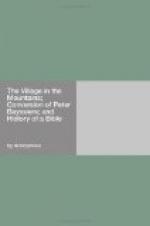I was in this wretched state when it pleased God to have pity upon me, and to cause a ray of light to penetrate my mind. One evening, after the labours of the day, instead of going as usual to the club which I frequented, I went alone upon the public walk, where I remained till the night was far advanced: the moon shone clear and bright: I had never before been so struck by the magnificence of the heavens, and I felt unusually disposed to reflection. “No,” I said, (after contemplating for a long time the impressive scene before me,) “no, nature is not God,” (for till then I had entertained this opinion,) “God is certainly distinct from nature: in all this I can only recognise a work replete with harmony, order, and beauty. Although I cannot perceive the Author, whose power, intelligence, and wisdom are every where so strongly imprinted on it; still, both my reason and my feeling combine to convince me of his existence.”
This conclusion, which I sincerely adopted, was the result of the reflections in which I had been that evening absorbed.
Some days after this, the examination of a watch, its springs, its various wheels, and its motions, brought me afresh to the same conclusion, and for ever confirmed me in the belief of a God, the Creator of all things. “If this watch,” I argued, “could not make itself, and necessarily leads us to suppose an artist who made each part, and so arranged the whole as to produce these movements—how much stronger reasons have we for concluding that the universe has a Contriver and Maker?”
I was no sooner fully satisfied of the existence of a God, than I trembled at the thought of his attributes, and my relationship to him. The sense of my unworthiness and sinfulness deeply affected me. When I called to mind the many years I had passed in forgetfulness of this great God; in indifference to, or in a culpable unbelief of his existence; I felt that I must indeed be, in his sight, the most ungrateful, and the most sinful of his creatures. My next feeling was an anxious desire to amend my conduct, and I determined to lay down such a plan for my future life, as I hoped might not be unworthy of that Being whose eye I then felt was upon me. After having made many efforts to recall the best maxims of wisdom and rules of virtue that I had met with in the course of my reading, I at length came to a resolution of examining what moral precepts the New Testament might contain, and whether it might not afford me the rules I was seeking for the regulation of my conduct.
This was the motive which brought me again to the New Testament, and induced me to undertake a fourth time the perusal of it. I wish it were in my power to recount to you, my dear children, all the effects that the eternal word of God produced upon my heart; for from that time I recognised it to be, what it is in fact, the revelation of sovereign wisdom; the genuine expression of the Divine will; the message of a tender and compassionate Father, addressed to his ungrateful and rebellious children, soliciting them to return and find happiness in him. I wish I could retrace all the impressions that this divine message produced on my mind, the vivid emotions I experienced, and the thoughts and feelings (never, I trust, to be forgotten) excited by that reading.




